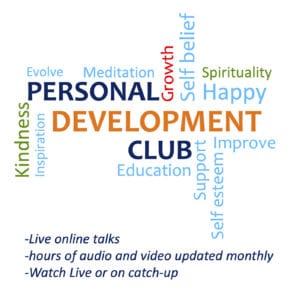
image: iStock photo
We’re all thinking of contagion right now due to the coronavirus. Let’s not forget that kindness is also highly contagious.
Scientists at Harvard and Yale measured the contagiousness of kindness out to three social steps. That is, when you be kind to someone, that person will be kind or kinder to someone else (1 social step from you), because of how you made the person feel, and the recipient of that kindness will be kind or kinder to someone else (2 social steps from you), and the recipient of that kindness will be kind or kinder to someone else (3 social steps from you).
In practice, kindness is ‘circularly contagious’, like the way a wave travels outwards in a circle when you drop a pebble in water.
What actually happens is that the person you are kind to ends up being kind or kinder to about 5 people (the number varies but this is an average) over the course of the next 24 hours (1 social step), and each of those 5 people are kind or kinder to 5 people over the next 24 hours (2 social steps), and each of those 5 are kind or kinder to 5 people (3 social steps).
That’s 5 x 5 x 5 = 125 people benefitting from a single act of kindness. Each time you are kind, you really are impacting far more people than just the person you help! I’m saying this because many of us wonder if our actions are insignificant. They’re are! Kindness matters greatly and you make a difference even with the smallest of acts.
In these strangest of times, we’re being encouraged to keep our physical distance, but let’s reduce our emotional distance. Pick up the phone, send a text, use Facetime, WhatsApp or Skype. Be there for family, friends, co-workers, neighbours, others in your community, if you can.
One thing I’ve learned over the years of trying to be a little kinder is that what might seem like a small act for you might mean the world to the person you help.
Other things are contagious too. Emotions are contagious. You can actually infect someone with a good mood (or even happiness) down a phone line. One of my friends phoned me a few days ago just to tell me a joke. I was chuckling to myself for hours afterwards. But even just being upbeat on the phone can activate the mirror neuron system (MNS) of the person’s brain. If you’re using the phone then it’s the auditory component of the MNS or if you’re using video, then it’s both the auditory and visual components. Either way, your upbeat tone specifically activates their brain regions for positive emotion and improves their mood. In a very real and scientific way, your mood is contagious! It’s known as mood contagion or emotional contagion.
Healthy lifestyle is also contagious and it works through what’s called social contagion, where we are inspired to take up certain behaviours of others. In these times, one of the best ways to support your immune system is to eat a healthy diet containing fruit, vegetables, fibre, nuts and seeds. Try to incorporate over 30 different plant ingredients a week (try counting them) to optimally support your gut microbiome, which supports your immune system. This is according to Tim Spector, a professor of genetic epidemiology at Kings College in London, and author of, ‘The Diet Myth’. If you have a handful of nuts, for example, containing peanuts, cashews, Brazil nuts and hazelnuts, then that counts as 4. If you dip bread in olive oil then that’s two (the bread grain plus the olive oil, coming from olives).
So if you eat well, you can not only help support your immune system but also that of some of your family and friends who might follow suit due to social contagion, especially if you communicate how healthy it is, and even do so in an upbeat way. Ultimately, if you do this partly to help them, then you’re also practicing kindness.
So while we increase our physical distance to help reduce the likelihood of contagion of coronavirus, let us increase the contagion of kindness instead.


David,
Your email has come at a very opportune time for me. I’m elderly and self isolating of course just now. Having been to several of your talks in Scotland over the last few years and having read several of your books, I have been greatly influenced, by you, in my understanding of, and attitude to, life. However, sometimes I benefit from being ‘reminded’ of things, such as the importance of kindness, for example. In a world populated by so many ‘fake’ people who manage to overly influence too many people, I find you to be really genuine, brimming with common sense and kindness. As I write this I have just seen Paul McKenna on the TV and he also came across to me as someone who, in the present uncertain world, is someone who is able to calm anxiety in a troubling environment. David, you are a doing a fantastic job! Please keep doing it and keep well. With my very best regards,
Thanks so much for your kind words, Aubrey. 🙂 With my very best regards to you too!
Thanks for sharing research and good ways to benefit from it.
Would be really cool to learn your view about how people can benefit from placebo effect regards the coronavirus. I believe we can use the placebo effect to alter the likely hood of becoming infected and how the virus will impact us if we become infected (bout positively and negatively). And wish this type of information would be share more to help people stay strong around the world.
Kind Regards
Hiya very nice blog!! Man .. Excellent .. Wonderful .. Alyce Dorian Chari
great content so good bro and thankyou
[…] you show kindness to another person, they are more likely to be kind to someone else. Research by Dr. David Hamilton indicates that one single act of kindness can multiply to 125 people within 24 hours. That’s a […]
[…] The logic behind this number is that when you are kind to someone, typically they spread kindness to 5 more people, who spread kindness to 5 more people, who spread kindness to 5 more people, totaling 125 people from that single act.1 […]
Can you please site the study this is linked to?
Hi Lauren, the original work was done by Nicholas Christakis and James Fowler. Here’s the link to the paper: https://pubmed.ncbi.nlm.nih.gov/20212120/ The rest of the blog is based on a handful of general observational pieces some friends and I have done where we made a rough count of how many people someone is kind to after someone helps them. That’s what I mean by the number varies, as it’ll depend on a lot of factors. I used 5 as the higher end to emphasise just how contagious helping behaviour can be. I hope that helps.